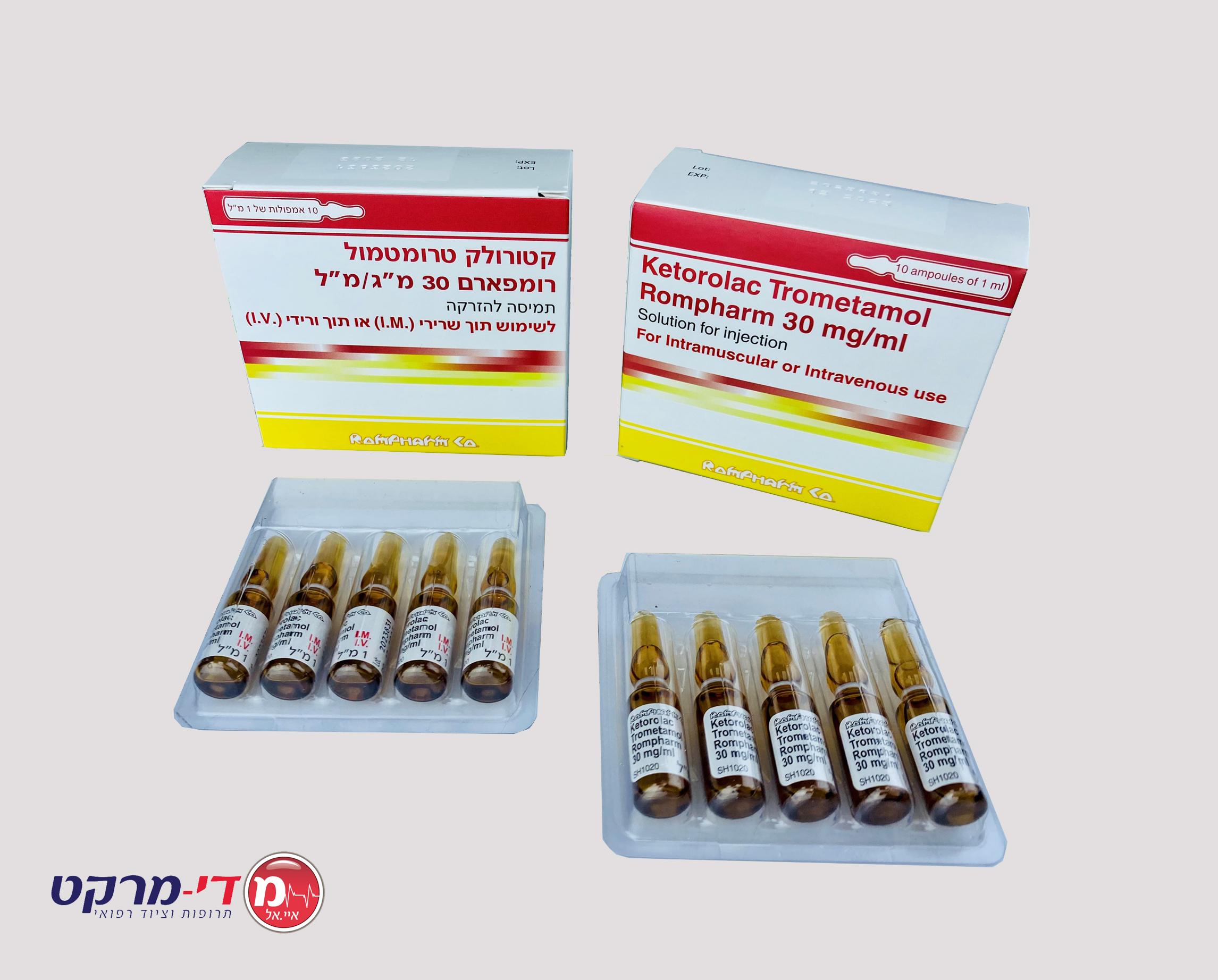Quest for the right Drug

קטורולק טרומטמול רומפארם 30 מ"ג/מ"ל KETOROLAC TROMETAMOL ROMPHARM 30 MG/ML (KETOROLAC TROMETAMOL)
תרופה במרשם
תרופה בסל
נרקוטיקה
ציטוטוקסיקה
צורת מתן:
תוך-שרירי, תוך-ורידי : I.M, I.V
צורת מינון:
תמיסה להזרקה : SOLUTION FOR INJECTION
עלון לרופא
מינוניםPosology התוויות
Indications תופעות לוואי
Adverse reactions התוויות נגד
Contraindications אינטראקציות
Interactions מינון יתר
Overdose הריון/הנקה
Pregnancy & Lactation אוכלוסיות מיוחדות
Special populations תכונות פרמקולוגיות
Pharmacological properties מידע רוקחי
Pharmaceutical particulars אזהרת שימוש
Special Warning עלון לרופא
Physicians Leaflet
Pregnancy & Lactation : הריון/הנקה
4.6 Fertility, pregnancy and lactation Fertility The use of ketorolac, as with any drug known to inhibit cyclooxygenase/ prostaglandin synthesis, may impair fertility and is not recommended in women attempting to conceive. In women who have difficulty conceiving or are undergoing investigation of infertility, withdrawal of ketorolac should be considered. See section 4.4 regarding female fertility. Pregnancy In humans, no clinical trials have been performed to detect teratogenic effects. As with other NSAIDs, during the third trimester of pregnancy, ketorolac trometamol favours the premature closure of the ductus arteriosus. Administered in the perinatal period, it can cause heavy bleeding. Ketorolac is contraindicated during pregnancy, labour, delivery or lactation (see section 4.3). Inhibition of prostaglandin synthesis may adversely affect the pregnancy and/or the embryo/foetal development. Data from epidemiological studies suggest an increased risk of miscarriage and of cardiac malformation and gastroschisis after use of a prostaglandin synthesis inhibitor in early pregnancy. The absolute risk for cardiovascular malformation was increased from less than 1%, up to approximately 1.5 %. The risk is believed to increase with dose and duration of therapy. In animals, administration of a prostaglandin synthesis inhibitor has been shown to result in increased pre- and post-implantation loss and embryo-foetal lethality. In addition, increased incidences of various malformations, including cardiovascular, have been reported in animals given a prostaglandin synthesis inhibitor during the organogenetic period. During pregnancy all prostaglandin synthesis inhibitors may expose: The foetus to: - Cardiopulmonary toxicity (with premature closure of the ductus arteriosus and pulmonary hypertension); - Renal dysfunction, which may progress to renal failure with oligo-hydramnios; Oligohydramnios/Neonatal Renal Impairment: Use of NSAIDs, including Ketorolac, at about 20 weeks gestation or later in pregnancy may cause fetal renal dysfunction leading to oligohydramnios and, in some cases, neonatal renal impairment. These adverse outcomes are seen, on average, after days to weeks of treatment, although oligohydramnios has been infrequently reported as soon as 48 hours after NSAID initiation. Oligohydramnios is often, but not always, reversible with treatment discontinuation. Complications of prolonged oligohydramnios may, for example, include limb contractures and delayed lung maturation. In some postmarketing cases of impaired neonatal renal function, invasive procedures such as exchange transfusion or dialysis were required. The mother and the neonate, at the end of the pregnancy, to: - Possible prolongation of the bleeding time, an anti-aggregating effect which may occur even at very low doses. - Inhibition of uterine contractions, resulting in delayed or prolonged labour. Ketorolac crosses the placenta to the extent of up to 10%. Labour and delivery Ketorolac is contraindicated in labour and delivery because, through its prostaglandin synthesis inhibitory effect it may adversely affect foetal circulation and inhibit uterine contractions, thus increasing the risk of uterine haemorrhage. Breast-feeding mothers Ketorolac has been detected in human milk at low concentrations. The administration of ketorolac is contraindicated during the breast-feeding period.

שימוש לפי פנקס קופ''ח כללית 1994
לא צוין
תאריך הכללה מקורי בסל
לא צוין
הגבלות
לא צוין
מידע נוסף
עלון מידע לרופא
05.07.21 - עלון לרופאעלון מידע לצרכן
לתרופה במאגר משרד הבריאות
קטורולק טרומטמול רומפארם 30 מ"ג/מ"ל